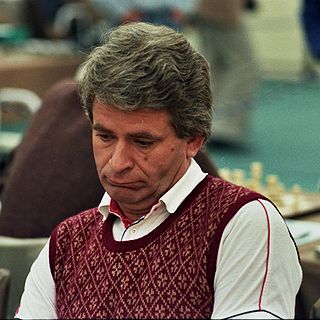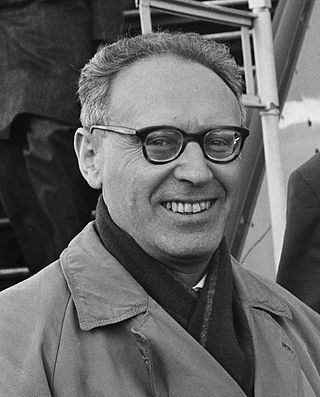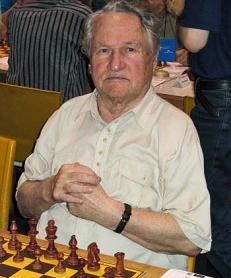
The International Chess Federation or World Chess Federation, commonly referred to by its French acronym FIDE, is an international organization based in Switzerland that connects the various national chess federations and acts as the governing body of international chess competition. FIDE was founded in Paris, France, on July 20, 1924. Its motto is Gens una sumus, Latin for 'We are one Family'. In 1999, FIDE was recognized by the International Olympic Committee (IOC). As of May 2022, there are 200 member federations of FIDE.

Boris Vasilievich Spassky is a Russian chess grandmaster who was the tenth World Chess Champion, holding the title from 1969 to 1972. Spassky played three world championship matches: he lost to Tigran Petrosian in 1966; defeated Petrosian in 1969 to become world champion; then lost to Bobby Fischer in a famous match in 1972.

Tigran Vartanovich Petrosian was a Soviet-Armenian chess grandmaster and World Chess Champion from 1963 to 1969. He was nicknamed "Iron Tigran" due to his almost-impenetrable defensive playing style, which emphasized safety above all else. Petrosian is often credited with popularizing chess in Armenia.

Mikhail Nekhemyevich Tal was a Soviet-Latvian chess player and the eighth World Chess Champion. He is considered a creative genius and is widely regarded as one of the most influential chess players. Tal played in an attacking and daring combinatorial style. His play was known above all for improvisation and unpredictability. Vladislav Zubok said of him, "Every game for him was as inimitable and invaluable as a poem".

David Ionovich Bronstein was a Soviet chess player. Awarded the title of International Grandmaster by FIDE in 1950, he narrowly missed becoming World Chess Champion in 1951. Bronstein was one of the world's strongest players from the mid-1940s into the mid-1970s, and was described by his peers as a creative genius and master of tactics. He was also a renowned chess writer; his book Zurich International Chess Tournament 1953 is widely considered one of the greatest chess books ever written.

Mikhail Moiseyevich Botvinnik was a Soviet and Russian chess grandmaster who held five world titles in three different reigns. The sixth World Chess Champion, he also worked as an electrical engineer and computer scientist and was a pioneer in computer chess. He also had a mathematics degree(honorary).

Vasily Vasilyevich Smyslov was a Soviet and Russian chess grandmaster, who was World Chess Champion from 1957 to 1958. He was a Candidate for the World Chess Championship on eight occasions. Smyslov twice tied for first place at the USSR Chess Championships, and his total of 17 Chess Olympiad medals won is an all-time record. In five European Team Championships, Smyslov won ten gold medals.

The USSR Chess Championship was played from 1921 to 1991. Organized by the USSR Chess Federation, it was the strongest national chess championship ever held, with eight world chess champions and four world championship finalists among its winners. It was held as a round-robin tournament with the exception of the 35th and 58th championships, which were of the Swiss system.

Paul Keres was an Estonian chess grandmaster and chess writer. He was among the world's top players from the mid-1930s to the mid-1960s, and narrowly missed a chance at a World Chess Championship match on five occasions. As Estonia was repeatedly invaded and occupied during World War II, Keres was forced by the circumstances to represent the former Soviet Union and Nazi Germany (1941–44) in international tournaments.
This is a timeline of chess.

Friðrik Ólafsson is an Icelandic chess grandmaster. He was president of FIDE from 1978 to 1982. He is a six-time Icelandic Chess Champion and a two-time Nordic Chess Champion.

Ratmir Dmitrievich Kholmov was a Russian chess Grandmaster. He won many international tournaments in Eastern Europe during his career, and tied for the Soviet Championship title in 1963, but lost the playoff. Kholmov was not well known in the West, since he never competed there during his career peak, being confined to events in socialist countries. His chess results were impressive, so this may have been for security reasons, as Kholmov had been a wartime sailor. But he was one of the strongest Soviet players from the mid-1950s well into the 1970s, and was ranked as high as No. 8 in the world by Chessmetrics.com from August 1960 to March 1961. Kholmov stayed active in competitive chess right to the end of his life, and maintained a high standard of play.

Larissa Ilinichna Volpert was a Soviet chess Woman Grandmaster and Russian and Estonian philologist. She was a three time Soviet women's chess champion.

Mikhail Gurevich is a Soviet-born Belgian chess player. He was a top ten ranked player from 1989 to 1991. Gurevich became an International Grandmaster in 1986, and is currently an FIDE arbiter and senior trainer.
The Nottingham 1936 chess tournament was a 15-player round robin tournament held August 10–28 at the University of Nottingham. It was one of the strongest of all time.

At the World Chess Championship 1963, Tigran Petrosian narrowly qualified to challenge Mikhail Botvinnik for the World Chess Championship, and then won the match to become the ninth World Chess Champion. The cycle is particularly remembered for the controversy surrounding the Candidates' Tournament at Curaçao in 1962, which resulted in FIDE changing the format of the Candidates Tournament to a series of knockout matches.
Vladimir Alexeyevich Alatortsev was a Soviet chess player, author, and administrator. During his career, he became champion of both Leningrad and Moscow, and played in the Soviet Chess Championship finals nine times, with his best competitive results in the 1930s. He placed clear second in the 1933 Soviet final. He retired from most competitive play in the early 1950s, moving into roles as a chess organizer, teacher, and coach. He served as chairman of the All-Union chess section from 1954 to 1959 and as chairman of the USSR Chess Federation from 1959 to 1961. By profession, he was a hydraulics engineer.
Yuri V Nikolaevsky was a Russian chess player. He won the Ukrainian Chess Championship three times, and represented the Soviet Union three times in international student team competition, winning a total of four medals. He was of Grandmaster strength at his peak in the early 1960s, but never received an international chess title due to lack of opportunities to play internationally. He played in three Soviet finals.

Sergey Kudrin is a Soviet-American chess Grandmaster.
The following lists events that happened during 1925 in the Union of Soviet Socialist Republics.














